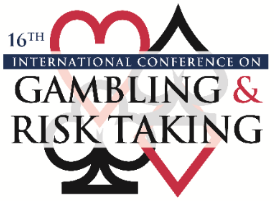Session Title
Session 1-3-C: Adolescence, Risk, and Gambling
Presentation Type
Event
Location
The Mirage Hotel & Casino, Las Vegas, Nevada
Start Date
7-6-2016 2:00 PM
End Date
7-6-2016 3:30 PM
Disciplines
Cognitive Psychology | Developmental Psychology | Educational Psychology | Mental and Social Health | Psychology | Substance Abuse and Addiction
Abstract
Around two thirds of Australian adolescents aged 10-14 years old have gambled in the last year, and rates of problem gambling are up to four times higher among adolescents than in the adult population. Schools provide a unique opportunity to intervene in cognitive and behavioural development, and while several gambling education programs exist in schools across Australia and internationally, few have been empirically evaluated. The purpose of this review was to provide a systematic appraisal of the published research on gambling education programs for adolescents. The review aimed to identify the number and quality of studies that have evaluated gambling education programs, and suggest recommendations for future research. A systematic search was conducted across five separate databases and a total of 17 studies were retained following screening and exclusion.
All of the included studies were efficacious in achieving some pre-post improvements in cognition, beliefs, attitudes, and knowledge. However, many failed to assess behavioural outcomes, and only a few to date have been effective in achieving any significant changes in gambling behaviour. Other methodological issues included the brevity of follow-ups, measurement concerns including loose definitions of adolescent problem gambling. There were also distinct flaws in the content and design of many programs. This review provides a knowledgebase for future research, including some guiding principles for the effective design and evaluation of a gambling education program. Consistencies across successful programs were examined to provide insight into what constitutes an effective gambling education program.
Keywords
problem gambling, education, prevention, youth, school, program, systematic, adolescent
Streaming Media
Included in
Cognitive Psychology Commons, Developmental Psychology Commons, Educational Psychology Commons, Substance Abuse and Addiction Commons
Gambling Education Programs for Adolescents: A Systematic Review
The Mirage Hotel & Casino, Las Vegas, Nevada
Around two thirds of Australian adolescents aged 10-14 years old have gambled in the last year, and rates of problem gambling are up to four times higher among adolescents than in the adult population. Schools provide a unique opportunity to intervene in cognitive and behavioural development, and while several gambling education programs exist in schools across Australia and internationally, few have been empirically evaluated. The purpose of this review was to provide a systematic appraisal of the published research on gambling education programs for adolescents. The review aimed to identify the number and quality of studies that have evaluated gambling education programs, and suggest recommendations for future research. A systematic search was conducted across five separate databases and a total of 17 studies were retained following screening and exclusion.
All of the included studies were efficacious in achieving some pre-post improvements in cognition, beliefs, attitudes, and knowledge. However, many failed to assess behavioural outcomes, and only a few to date have been effective in achieving any significant changes in gambling behaviour. Other methodological issues included the brevity of follow-ups, measurement concerns including loose definitions of adolescent problem gambling. There were also distinct flaws in the content and design of many programs. This review provides a knowledgebase for future research, including some guiding principles for the effective design and evaluation of a gambling education program. Consistencies across successful programs were examined to provide insight into what constitutes an effective gambling education program.


Comments
Attachment: PDF containing 28 slides; Title slide: School-Based Gambling Education Programs: A Systematic Review
Audio recording of this presentation is attached as a downloadable MP3 audio file, 46.2 MB
This presentation starts at 24:47